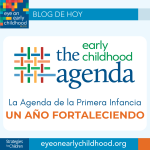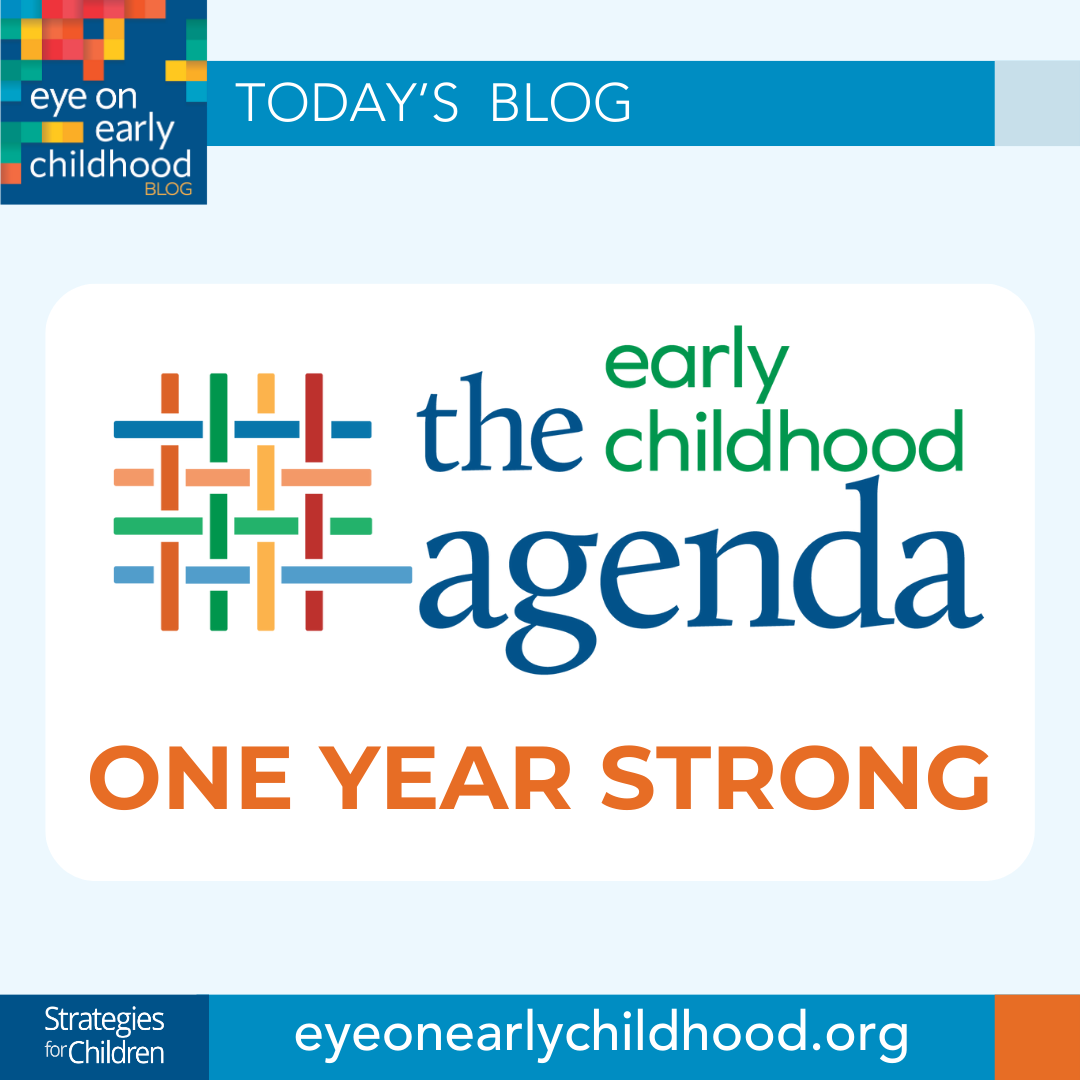The Early Childhood Agenda, a statewide initiative to improve the lives of young children, is a year old, and we’re excited to share its story and mark its progress.
What makes the Agenda so powerful is that it shows how more than 500 partners can work together on behalf of children.
The Early Days
When the pandemic hit, Strategies for Children set up the 9:30 Call, a small group call for sharing problems, information, policies, and support. The Call quickly grew. More early educators logged on. More policymakers appeared as guest speakers. And the field was less isolated.
“In the first year of Covid, the 9:30 Call was focused on early education and care. But we kept getting requests for guest speakers in other areas,†Marisa Fear, Strategies’ director of policy, says. “So we got to learn about a lot of new things. And we began to reflect on why we were being asked about food security and health, and HR issues, like how providers were navigating pandemic-related health and safety restrictions.â€
As these conversations continued, a key fact emerged: thanks to the 9:30 Call, the early education and care field could address common issues and take common actions. It also became clear that Massachusetts couldn’t just focus on early education and care. To meet children’s needs, the state had to focus on everything that affects children’s lives.
“Covid gave us a bit of a gift. We had to cooperate and operate outside of silos to figure out how support and success could be achieved. It gave us this whole new level of permission,†Kim Davenport, vice president of Initiatives & Aligned Programs at Edward Street, says. “The question became, Could we do more?â€
An Experiment
How do large groups of people work together to make children’s lives better? Strategies worked with Northeastern University Professor Kim Lucas to find out.
In spring of 2022, Lucas designed a pilot session at the Boston Area Research Initiative’s annual conference that brought early childhood partners together in person, asked them to individually list their top systemic challenges, and then to merge the results into a list of collective challenges. The group did the same work with solutions, listing individual approaches, then merging them into a collective list.
“That experience gave us the confidence to say, Okay, this works, how do we translate it into a virtual environment,†Fear says, explaining that among the next steps were finding virtual tools that large groups could use to work together and conduct a landscape analysis of other states.
Next, drawing on its 25-year history and connections in early childhood, Strategies convened The Early Childhood Agenda and reached out to anyone and everyone who might be interested and asked what topics should be included in an early childhood agenda.
Asking everyone meant listening to everyone, and it meant continuously asking who wasn’t in the room, and who wasn’t being heard. Mo Barbosa, a seasoned nonprofit professional, facilitated the conversation.
An important ingredient, Davenport explains, was vulnerability.
“People who had been doing this work for a long time were opening themselves up to hear new input from other sectors about how to get to a goal they had been trying to achieve for years.â€
“Strategies wrote up the Agenda, wordsmithing with hundreds of people. It could have been the beginning of a disaster, but it was exactly what the group needed, because people were able to see their own fingerprints all over this work.â€
The result was The Early Childhood Agenda, a list of 10 priorities that include strengthening early childhood programs, building a more secure economic safety net for families, and improving governance by creating partnerships like Children’s Cabinets at the city and state level. The Agenda was released at the State House on January 24, 2023.
Organizing the Work
Implementing the Agenda and all 10 of its priorities was a daunting task. Collaboration was essential, so Strategies worked with six established coalitions, launching seven new workgroups, each with its own facilitators and lived experience leaders, and hiring two project managers.
“I have been so excited to see the Agenda move and gain traction,†Amanda Saillant says of the progress that’s being made. Saillant is one of the project managers, and she’s supporting several workgroups, including the workgroup focused on priority #5, building a quality improvement infrastructure for programs and services. This workgroup is being led by Binal Patel, the chief program officer at Neighborhood Villages. To develop a collective understanding, discussions have focused on what quality means for programs, including topics such as quality indicators, how quality is measured, and what the threats are to quality programming and implementation.
“We’re also going to look at state infrastructure,†Saillant says, “what infrastructure currently exists, who is interacting with it, and who is not.â€
This month, the workgroup will do a deep dive into one piece of that infrastructure, the Commonwealth Preschool Partnership Initiative (CPPI), to understand what the program does, and what it might do in the future.
Jeremy Rosen, who is also a project manager and a graduate student at Brandeis University, is staffing the workgroup focused on priority #2, advancing workforce compensation.
This workgroup started out by defining terms for its advocacy effort, considering who is and is not included in the term “early childhood professional.†The workgroup is also collaborating with the Center for the Study of Child Care Employment at the University of California, Berkeley. The Center has helped with defining terms and is providing information about how other states are trying to improve workforce compensation.
One framework for increasing salaries is advocating for pay parity.
Another framework, Rosen explains, is advocating for a living wage.
“But then some people say, Well, why are we limiting ourselves to a living wage? We should be thinking about a thriving wage.â€
For all the workgroups, inclusion — especially for those with lived experiences — is essential.
“This piece has to be very intentionally built in,†Rosen explains. “We would be missing the whole point of The Early Childhood Agenda if we didn’t include everyone.â€
That point is to tap into the richness of hearing and incorporating everyone’s vision.
To do this, the workgroup sets meeting times to accommodate professionals working with young children and families. There’s outreach to ask people if they feel included. And there are paid positions for people with lived experience — including early educators, family child care providers, program directors, and parents — to lead in workgroup meetings, help with planning, and share their valuable insights.
One example is Laura McGowan.
McGowan had spent years working as a floral designer. She stopped when her daughter was born. Then the pandemic hit, and McGowan was stuck at home, being a parent, thinking about finding a new career, and trying not to get Covid.
Eager for something to do, she started participating in online programs offered by the local Coordinated Family and Community Engagement (CFCE) program, which was run by Self Help Inc.
“They put me through a training with an organization called Families First,†McGowan says. And Families First trained her to be a better advocate for her CFCE program.
Today, McGowan is earning a college degree in Human Services, and she’s one of The Early Childhood Agenda’s lived experience leaders. She is part of the workgroup that’s focused on priority #4, supporting developmental monitoring, screening, referrals and delivery of services.
The group’s initial goal is to work with organizations to publicize the importance of screenings and referrals in April during Statewide Screening Week, running concurrently with the Week of the Young Child.
At first, McGowan says, the experience was intimidating. The group was full of professionals using acronyms that she couldn’t decode. But she quickly chimed in, offering insights, explaining what she knew, sharing, for example, that some parents are afraid that developmental screenings will be used not to help, but to label children as poor performers.
That fear, she says, is completely understandable.
“There’s so much pressure on parents,†she says, “to raise perfect kids.â€
Looking Ahead
On May 8 in Worcester, The Early Childhood Agenda’s partners will convene in person for the first time since the Agenda’s launch at the State House event in January 2023. Save the date, and stay tuned to this blog for updates.
Then, one year from now, in January 2025, The Early Childhood Agenda will release recommendations that will change policies and systems and create a better environment for young children and their families.
It’s leadership that’s badly needed. Young children don’t have enough access to high-quality programs. Parents don’t have enough support. Government systems aren’t nimble enough to offer seamless experiences and assistance.
“Until our federal government invests in the wellbeing of young children and their families,†Saillant says, “It’s up to states and cities to innovate and share those innovations. I think Massachusetts can be a beacon in these efforts.â€
And then, ideally, Massachusetts will become a state where Laura McGowan can say that instead of pressure to raise perfect kids, Massachusetts provides an extensive system of early childhood support that helps parents raise happy, healthy kids.
For more information, contact Marisa Fear at mfear@strategiesforchildren.org.



[…] Promoting screenings is also an important way to address parents’ concerns. As Laura McGowan, an advocate for families, explains, parents and guardians may not access these services because they worry that their children may be stigmatized. […]
[…] a lived experience leader for The Early Childhood Agenda, McGowan is a member of the Agenda workgroup that’s focused on […]